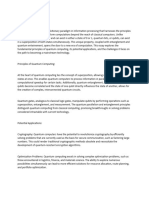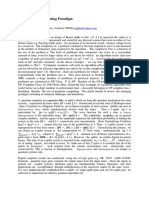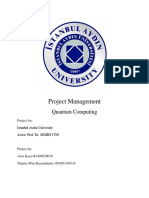0% found this document useful (0 votes)
51 views7 pagesQuantum Computing - Revolutionizing Information Processing
Quantum computing leverages the principles of quantum mechanics to process information in ways classical computers cannot, promising advancements in fields like drug discovery, cryptography, and artificial intelligence. Despite significant technical challenges such as quantum decoherence and error rates, current quantum devices have already shown remarkable capabilities, including achieving 'quantum supremacy.' The future of quantum computing holds the potential to revolutionize industries and scientific discovery, while also raising concerns about security and global power dynamics.
Uploaded by
bedayeg187Copyright
© © All Rights Reserved
We take content rights seriously. If you suspect this is your content, claim it here.
Available Formats
Download as PDF, TXT or read online on Scribd
0% found this document useful (0 votes)
51 views7 pagesQuantum Computing - Revolutionizing Information Processing
Quantum computing leverages the principles of quantum mechanics to process information in ways classical computers cannot, promising advancements in fields like drug discovery, cryptography, and artificial intelligence. Despite significant technical challenges such as quantum decoherence and error rates, current quantum devices have already shown remarkable capabilities, including achieving 'quantum supremacy.' The future of quantum computing holds the potential to revolutionize industries and scientific discovery, while also raising concerns about security and global power dynamics.
Uploaded by
bedayeg187Copyright
© © All Rights Reserved
We take content rights seriously. If you suspect this is your content, claim it here.
Available Formats
Download as PDF, TXT or read online on Scribd
/ 7

















































































